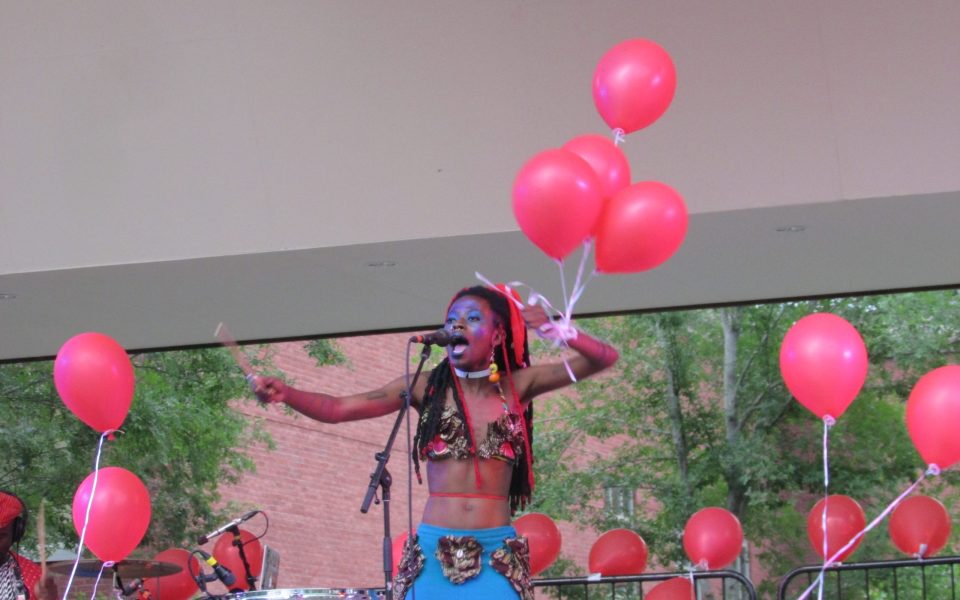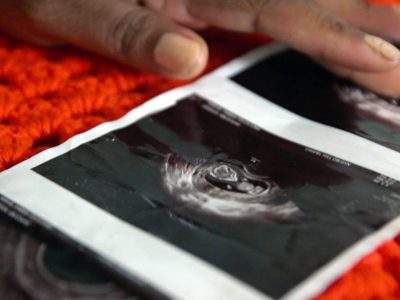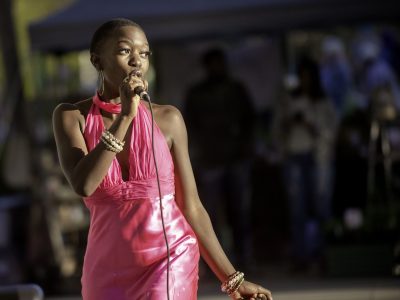“I know you’re going through a lot,” the Ghanaian singer and performance artist Jojo Abot was saying to the crowd at LeBauer Park in downtown Greensboro. “Your healing lies within you, if you can access it. Learn to love yourself, and then you can love others.
“Pay yourself to do that healing work,” she continued. “Would you pay yourself 10 dollars an hour? Twenty? Thirty? Peace is worth more than gold.”
Abot’s musing on what has value, what constitutes payment and whether something that’s free has worth might have gone past some in the noncommittal audience for the free concert at Greensboro’s LeBauer Park on June 9. All they had to do was show up, and even though the sky had cleared by the 7:30 p.m. start time, the field was only sparsely filled, with many people apparently deterred by a sudden downpour about an hour earlier.
Abot puts on a show: Dressed in a midriff- and back-baring top with loose blue pants adorned with gold epaulettes at the hips, pelvis and ankles, blue eye makeup and a red ribbon tossed into flowing dreadlocks, she pounded a floor tom and prowled the stage while punctuating the swells of her magnificent vocal instrument with playful shrieks. Abot’s musical accomplices, two men dressed in flowing red robes, respectively on drums and keyboards, built a mighty groove machine behind the singer — an electroclash-Afrobeat hybrid that she calls “Afro-hypno-sonic.”
Maybe the audience should have been required to monetize the experience to put some skin in the game. But whatever the circumstances, Abot was determined to throw a soul-transporting dance party that they wouldn’t forget in her allotted hour on stage. For the first two numbers, she ignored the audience’s lethargy, tending to her own fire, then gradually began to coax them into a communal energy force.
“The weather has been a wonder and unpredictable,” Abot said in a soft voice that belied her gale-force vocals. “The rain gave us a blessing, and said, ‘Let’s give these people a good time.’ If you feel like grooving, feel free to stand up and take up space, and heal together, to be you with us.”
A handful of people took her up on the offer, including a mom chaperoning three small girls.
Playing the role of workshop leader for Shamanic Concert Experience 101, Abot continued, “As you give me energy, I give you more energy. As you give each other love, we become family and I give you even more love.”
Later, she pleaded, “I was in South Africa a week ago. I’ve traveled far to be here. Give some love. Radiate some love.”
Eventually, the standoffish crowd did converge into a communal centrifuge and reflect back a small portion of the energy from the stage, although to Abot’s disappointment, they allowed a smudge stick of sage incense to burn out before the end of the concert. A welter of different ages, races, genders, sexual orientations and abilities united under one groove, the dance circle finally achieved the heightened focus that Abot sought.
Drawing from her two recent EPs — the more ambient Fyfa Woto from 2015 and the more aggro Ngiwunkulunkulu from 2017 — the vibe Abot projected most during her family-oriented Greensboro show was healing. In a time of multiplying traumas, from the routine killing of unarmed black people at the hands of the police to immigrant families ripped apart by ICE, using art as a tool of healing seems unexpectedly subversive, or at least a suitable starting point.
In an essay for Ngiwunkulunkulu, which means “I am God,” Abot reflects on her awakening black consciousness as a native of Ghana — which became the first African country to gain independence from British colonial rule in 1957 — moving to South Africa, which remained under the apartheid rule of a white minority until the early 1990s.
“Controlled by fear of losing what was not theirs to begin with, a minority chose hatred and separation as a pathway to maintaining control and wealth,” Abot writes. “Operating off apathy to other humans, cruelty was normalized just as we see it being done today. Separation creates isolated experience which in turn dulls empathy for those outside of our immediate world.”
With a more willing partnership from the audience at the free concert in Greensboro, the provocative, radical challenge — a flipside to healing in the duality of her cosmology — might have emerged more fully.
As Abot writes: “Standing firmly on the strength of ancestral bonds and powers of beings who walked this earth with dignity, unimaginable spiritual strength and immense intellect unique to who we are yet connected to cultures worldwide, we must rediscover the self with love, compassion and purpose as an entry point to being able to extend that to life around us. Gracefully letting go of the weight of our past in order to levitate and fly free. No longer shackled in mind, body or spirit.”
Near the end of the concert, Abot thanked a woman for breast-feeding her child and then turned to the larger audience. “Your laughter makes me so happy,” she said. “I’m crushing on all of you. This is our first date, so it’s totally awkward.”
Then, as her band projected a sonic boom of synth-wave and trap-set syncopation, Abot made a gesture that seemed poised on the knife’s edge between authenticity and professionalism: She worked her way through the audience, hugging concertgoers like old friends.
Join the First Amendment Society, a membership that goes directly to funding TCB‘s newsroom.
We believe that reporting can save the world.
The TCB First Amendment Society recognizes the vital role of a free, unfettered press with a bundling of local experiences designed to build community, and unique engagements with our newsroom that will help you understand, and shape, local journalism’s critical role in uplifting the people in our cities.
All revenue goes directly into the newsroom as reporters’ salaries and freelance commissions.





Leave a Reply